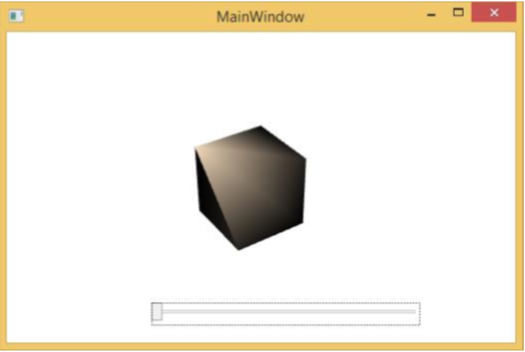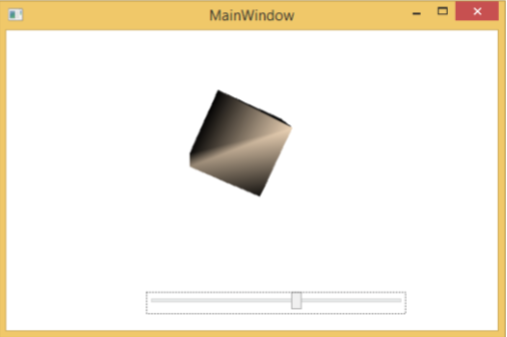WPF - 3D ग्राफिक्स
विंडोज प्रेजेंटेशन फाउंडेशन (WPF) आपके एप्लिकेशन की आवश्यकता के अनुसार 3D ग्राफिक्स बनाने, बदलने और एनिमेट करने के लिए एक कार्यक्षमता प्रदान करता है। यह पूर्ण विकसित 3 डी गेम के विकास का समर्थन नहीं करता है, लेकिन कुछ स्तर तक, आप 3 डी ग्राफिक्स बना सकते हैं।
2 डी और 3 डी ग्राफिक्स के संयोजन से, आप समृद्ध नियंत्रण भी बना सकते हैं, डेटा के जटिल चित्र प्रदान कर सकते हैं या किसी एप्लिकेशन के इंटरफ़ेस के उपयोगकर्ता अनुभव को बढ़ा सकते हैं। Viewport3D तत्व हमारे WPF एप्लिकेशन में एक 3D मॉडल होस्ट करता है।
उदाहरण
आइए 3 डी ग्राफिक्स का उपयोग करने के तरीके को समझने के लिए एक सरल उदाहरण लेते हैं।
नाम के साथ एक नया WPF प्रोजेक्ट बनाएं WPF3DGraphics।
निम्न XAML कोड दिखाता है कि 3D ज्यामिति का उपयोग करके 2 डी ऑब्जेक्ट कैसे बनाया जाए।
<Window x:Class = "WPF3DGraphics.MainWindow"
xmlns = "http://schemas.microsoft.com/winfx/2006/xaml/presentation"
xmlns:x = "http://schemas.microsoft.com/winfx/2006/xaml"
xmlns:mc = "http://schemas.openxmlformats.org/markup-compatibility/2006"
xmlns:local = "clr-namespace:WPF3DGraphics"
mc:Ignorable = "d" Title = "MainWindow" Height = "500" Width = "604">
<Grid>
<Viewport3D>
<Viewport3D.Camera>
<PerspectiveCamera Position = "2,0,10" LookDirection = "0.2,0.4,-1"
FieldOfView = "65" UpDirection = "0,1,0" />
</Viewport3D.Camera>
<ModelVisual3D>
<ModelVisual3D.Content>
<Model3DGroup>
<AmbientLight Color = "Bisque" />
<GeometryModel3D>
<GeometryModel3D.Geometry>
<MeshGeometry3D Positions = "0,0,0 0,8,0 10,0,0 8,8,0"
Normals = "0,0,1 0,0,1 0,0,1 0,0,1" TriangleIndices = "0,2,1 1,2,3"/>
</GeometryModel3D.Geometry>
<GeometryModel3D.Material>
<DiffuseMaterial Brush = "Bisque" />
</GeometryModel3D.Material>
</GeometryModel3D>
</Model3DGroup>
</ModelVisual3D.Content>
</ModelVisual3D>
</Viewport3D>
</Grid>
</Window>जब आप उपरोक्त कोड को संकलित और निष्पादित करते हैं, तो यह 3 डी में 2 डी ऑब्जेक्ट का उत्पादन करेगा।

उदाहरण
आइए एक और उदाहरण देखें जो एक 3 डी ऑब्जेक्ट दिखाता है।
नाम के साथ एक नया WPF प्रोजेक्ट बनाएं WPF3DGraphics1
निम्नलिखित XAML कोड एक 3D ऑब्जेक्ट और एक स्लाइडर बनाता है। स्लाइडर की मदद से आप इस 3D ऑब्जेक्ट को घुमा सकते हैं।
<Window x:Class = "WPF3DGraphics1.MainWindow"
xmlns = "http://schemas.microsoft.com/winfx/2006/xaml/presentation"
xmlns:x = "http://schemas.microsoft.com/winfx/2006/xaml"
xmlns:d = "http://schemas.microsoft.com/expression/blend/2008"
xmlns:mc = "http://schemas.openxmlformats.org/markup-compatibility/2006"
xmlns:local = "clr-namespace:WPF3DGraphics1"
mc:Ignorable = "d" Title = "MainWindow" Height = "350" Width = "525">
<Grid>
<Viewport3D Name="viewport3D1">
<Viewport3D.Camera>
<PerspectiveCamera x:Name = "camMain" Position = "6 5 4" LookDirection = "-6 -5 -4">
</PerspectiveCamera>
</Viewport3D.Camera>
<ModelVisual3D>
<ModelVisual3D.Content>
<DirectionalLight x:Name = "dirLightMain" Direction = "-1,-1,-1">
</DirectionalLight>
</ModelVisual3D.Content>
</ModelVisual3D>
<ModelVisual3D x:Name = "MyModel">
<ModelVisual3D.Content>
<GeometryModel3D>
<GeometryModel3D.Geometry>
<MeshGeometry3D x:Name = "meshMain"
Positions = "0 0 0 1 0 0 0 1 0 1 1 0 0 0 1 1 0 1 0 1 1 0 1 1"
TriangleIndices = "2 3 1 3 1 0 7 1 3 7 5 1 6 5 7 6 4 5 6 2 0
2 0 4 2 7 3 2 6 7 0 1 5 0 5 4">
</MeshGeometry3D>
</GeometryModel3D.Geometry>
<GeometryModel3D.Material>
<DiffuseMaterial x:Name = "matDiffuseMain">
<DiffuseMaterial.Brush>
<SolidColorBrush Color = "Bisque"/>
</DiffuseMaterial.Brush>
</DiffuseMaterial>
</GeometryModel3D.Material>
</GeometryModel3D>
</ModelVisual3D.Content>
<ModelVisual3D.Transform>
<RotateTransform3D>
<RotateTransform3D.Rotation>
<AxisAngleRotation3D x:Name = "rotate" Axis = "1 2 1"/>
</RotateTransform3D.Rotation>
</RotateTransform3D>
</ModelVisual3D.Transform>
</ModelVisual3D>
</Viewport3D>
<Slider Height = "23" HorizontalAlignment = "Left"
Margin = "145,271,0,0" Name = "slider1"
VerticalAlignment = "Top" Width = "269"
Maximum = "360"
Value = "{Binding ElementName = rotate, Path=Angle}" />
</Grid>
</Window>जब आप अपना एप्लिकेशन चलाते हैं, तो यह आपकी विंडो पर 3D ऑब्जेक्ट और स्लाइडर का उत्पादन करेगा।

जब आप स्लाइडर को स्लाइड करते हैं, तो आपकी विंडो पर ऑब्जेक्ट भी घूम जाएगा।

हम अनुशंसा करते हैं कि आप उपरोक्त कोड निष्पादित करें और अधिक 3 डी ज्यामिति का प्रयास करें।